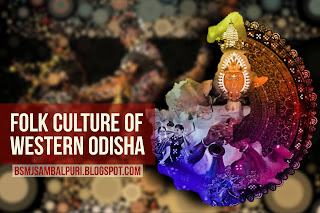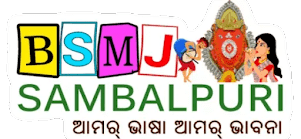Introduction:
Traditional values in a reformed on each culture. It consists of ethics, ideals, customs, deities, travel, festivals, social rituals, language, literature, religion, politics, art, architecture, faith, food, clothing, and behavior. According to hereditary, it moves from time to time, from tradition to tradition, from man to man. Secular culture maintains its uniqueness even if the mentality of people changes over time. Because the traditional customs and lifestyles of a particular region are secular, culturally based. In English, it is called 'Folk Culture' or 'Common traditional cultural'. In this regard, the place of folk culture in western Odisha is unique, which is a topic of discussion here.
Folk culture in Western Odisha:
From Sundergarh district to Kalahandi district, the folk culture of western Odisha is based on the lifestyle of more than five crore people. The people’s culture of western Odisha has long maintained its own independence and self-esteem in an unchanging trend in the evolution of time and civilization. In all districts of Western Odisha like Sundergarh, Sambalpur, Jharsuguda, Deogarh, Bargarh, Subarnapur, Boudh, Kandhamal, Balangir, and Kalahandi districts the rituals include Osha, Brata, Devotion, Marriage Ritual, Religion, Food and Drink, Clothing, Social Rituals, Dharma - Tradition, Household, Tradition, Rural Politics, Journeys, Festivals, Dance, Music, Arts, Architecture, Agriculture, Weaving, and Household Policies. Folk culture has gained a foothold in traditional ideology.
Aspects of the folk culture:
The folk culture of western Odisha has a special place on a regional basis. Discussions from various angles are relevant here, which are given below, -
Gods and folk rituals:
The People of Western Odisha worship many gods and goddesses like Maa Samaleswari, Maa Patneswari, Maa Manikeswari, Shree Jagannath, Budharaja, Bimaleshwar, Narsinghnath, Harishankar, Soneshwar of Koshaleshwar, Champeshwar, Baneshwar, and Vaidnath Baba. Also, they worship Gram Devi / Gram Devta in each village as 'village god and goddess'.
Believing in agriculture and innumerable civilizations, some of the inhabitants of the region worship the classical and secular deities. People also do ‘Shivapuja’ in Sitalshasthi, ‘Krishnapuja’ in Dhanuyatra, ‘Vishnupuja’ in Krishna Charushilata, ‘Jagannath Puja’ in Rathyatra, ‘Samaleshwari Puja’ during Navanna, ‘Shivapuja’ on the day of Jagar based on the festival and occasion.
Overall, the worship of the goddess of western Odisha, which has been a tradition of solidarity for more than a century, has been able to inspire everyone.
Folk Dance, Song, and Music Instruments:
Traditional folk dances, folk songs, and music in cultural institutions are played in weddings, festivals, and travels bring joy to the masses. Some popular songs and music include 'Dalkhai', 'Rasarkali', 'Humobauli', 'Ghumara', 'Chhat', 'Ghoghorani', 'Danda', 'Ghuduka', 'Krishnaguru', 'Gaudibadi' etc. The musical instruments used along with the folk songs are 'Jhumka', 'Dhol', 'Mahuri', 'Pipi', 'Dubi', 'Nishan', 'Murdang', 'Mandal', 'Gini', 'Tulki', 'Dap', 'Ghubukudu', 'Ghudka', 'Sarangi', 'Kasai' etc.
Popular Sambalpuri folk dramas are also organized at various cultural institutions, festivals, and pilgrimages. Because of all this, folk dances, folk songs and folk dances performed in traditional folk culture have taken a special place in the Sambalpur area.
Pilgrimages and festivals in folk culture:
In the folk culture of western Odisha, various festivals are organized to celebrate social harmony and worldly life in the traditional rituals. Among them are 'Nuakhai', 'Pushpuni', 'Dashahara', Bhai Jiuntia ',' Puo Jiuntiya ',' Fagunpuni ',' Gudikhai ',' Dembalpuja ',' Rath Yatra ',' Dhanuyatra ',' Shivaratri Mela '. , 'Tumadhama', 'Kalsi yatra', 'Harishankar Mela', 'Shital Sasthi' and 'Dhanuyatra' are memorable. These festivals really reflect the culture and traditions of western Odisha.
Conclusion
Although time has been changing and people are more attracted to the modern world, The evergreen folk culture of western Odisha always is among the people. Because of all this, it would not be an exaggeration to say that the folk culture of the West has occupied a special place.










